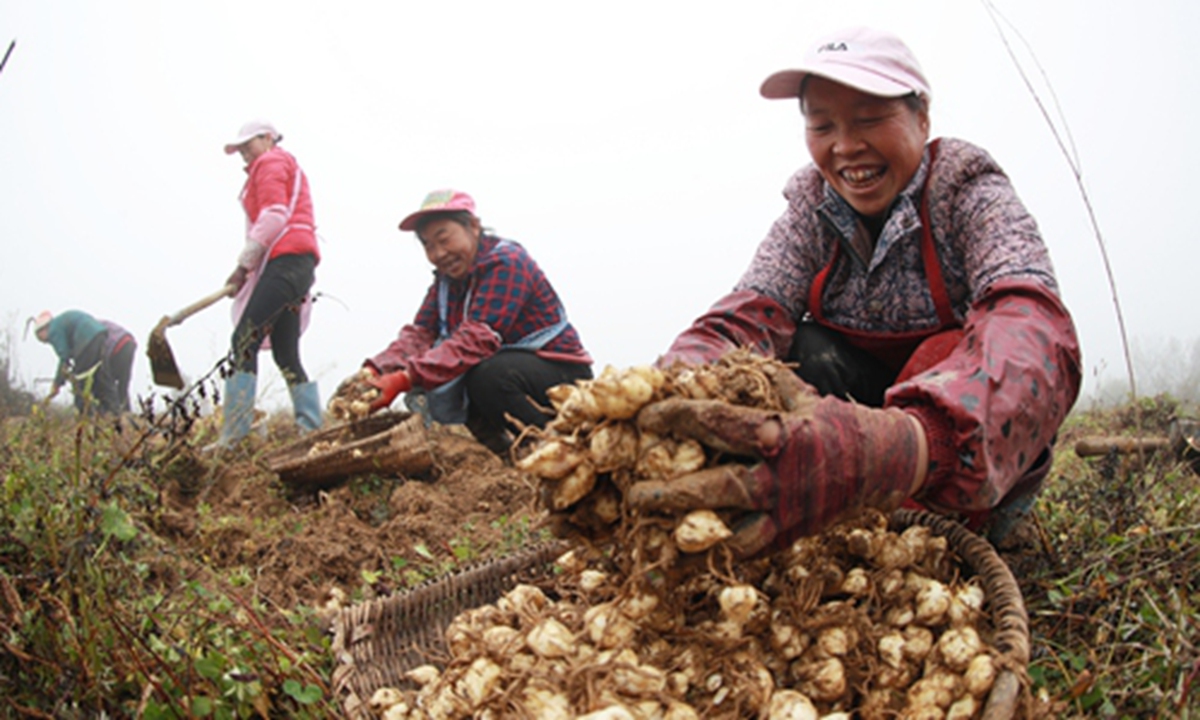System advantage helps China defeat extreme poverty
By Yu Shaoxiang Source: Global Times Published: 2020/11/24 21:19:03

Villagers harvest lilies in Bijie, Southwest China's Guizhou Province. They are poverty-stricken households and can earn 100 yuan ($14.2) a day working at the Chinese herbal plantation base. The plantation has helped 61,698 villagers emerge from poverty in recent years, media reports said. Photo: VCG
All 832 nation-level poor counties in China have been lifted out of poverty as of Monday. This indicates that China has achieved the historical feat of resolving extreme poverty.
This worldwide problem was addressed through targeted poverty alleviation efforts. Such a remarkable achievement is inseparable from China's system advantage in mainly three aspects.
First, China is able to concentrate its efforts on major tasks with strict enforcement of orders and prohibitions. This is what many other countries cannot do. Through the government's extensive mobilization, all sectors of Chinese society have been motivated to offer a hand in the poverty alleviation campaign, forging the last line of defense in this great fight against destitution.
Second, based on local conditions, we helped people move out of places such as remote mountains that are not suitable to live in. This was a complex project requiring a great amount of capital and manpower. It also demanded coordination between governments between their origins and place of settlement. The relocation efforts solved the survival problem of many people. This precisely demonstrates that targeted poverty alleviation measures are proof positive of China's logistical and political policies.
Third, China has reduced poverty with industrial development. This has been one of the most direct and effective measures to offer long-term solutions for impoverished places. Nowadays, many places around the world are still troubled by poverty. Even in developed capitalist countries there are large numbers of people living under crippling circumstances. Capitalism's nature of profits at all costs determines that many countries don't take poverty relief as one of their top priorities. Hence, they are not likely to provide institutional guarantees through methods like policy preferences.
China has accumulated a lot of practical experience in the past few years with its concerted anti-poverty campaigns. Against this backdrop, we can contribute Chinese wisdom to the governance of global poverty.
The first is to strengthen institutional guarantees and implement a management system in which the central government makes calls, while local governments make sure that orders are fully implemented.
Second, we adhered to targeted measures to improve effectiveness for alleviation relief efforts and solved the practical problems of, "who needs help, who will help, and what way is best to help."
The third is insisting on mobilizing all sectors of society to take part in the poverty alleviation.
Fourth, it is important to stick to strict requirements at every step of the poverty alleviation program. These include the supervision of the government officials responsible for the work. China has also exerted the modernized governance techniques on the whole process of targeted poverty alleviation.
Finally, we should also attach importance to intellectual support while providing financial assistance to those in need. A combination of both will stimulate endogenous driving forces for further poverty alleviation.
China not only emphasizes poverty reduction, but also avoids situations where people can fall into poverty again. There may be many reasons for the return to poverty. One reason might be backward infrastructure and medical conditions in some rural areas. These conditions may cause people to be caught in financial difficulties due to illness or disasters. Other conservative life customs in some rural areas, such as luxurious weddings, may also lead some to take out unreasonable loans that they have trouble paying back.
This means that the government cannot simply leave people alone right after they are lifted out of absolute poverty. Continued poverty alleviation mechanism is needed to continue to improve life. Monitoring system needs to be established to prevent people from returning to poverty. Individuals and households who are in more vulnerable situations and in marginal areas are the main targets to monitor.
The elimination of extreme poverty does not mean that the problem of poverty will no longer exist. After all, "poverty" is a relative concept. Therefore, as extreme poverty is now deemed to be officially eliminated, China's definition of poverty will gradually expand. The goal will be to upgrade from meeting the needs of basic subsistence to living a decent life. These include providing clean drinking water, better health care and education. After 2020, China will continue to take poverty alleviation as one of its priorities and introduce new poverty standards that keep pace with the times and set higher goals.
The author is chief research fellow with the National Institute of Social Development, Chinese Academy of Social Sciences. opinion@globaltimes.com.cn
Posted in: VIEWPOINT